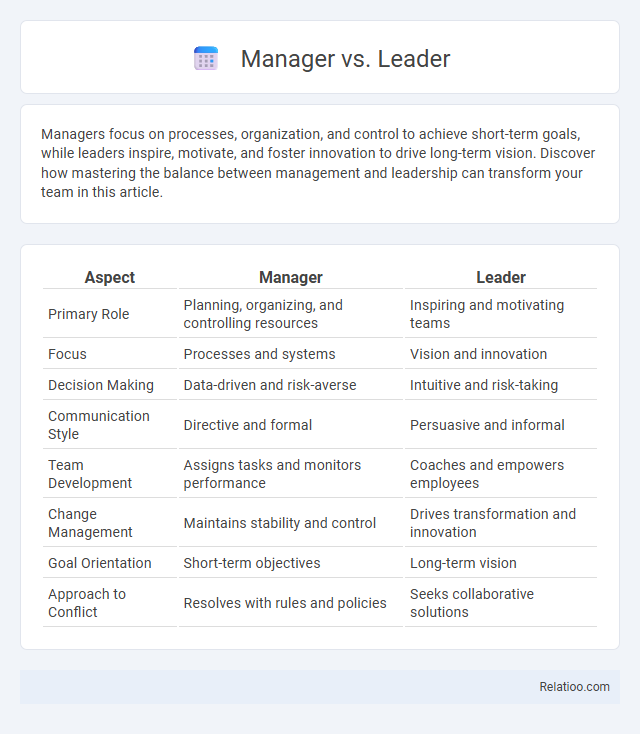Managers focus on processes, organization, and control to achieve short-term goals, while leaders inspire, motivate, and foster innovation to drive long-term vision. Discover how mastering the balance between management and leadership can transform your team in this article.
Table of Comparison
| Aspect | Manager | Leader |
|---|---|---|
| Primary Role | Planning, organizing, and controlling resources | Inspiring and motivating teams |
| Focus | Processes and systems | Vision and innovation |
| Decision Making | Data-driven and risk-averse | Intuitive and risk-taking |
| Communication Style | Directive and formal | Persuasive and informal |
| Team Development | Assigns tasks and monitors performance | Coaches and empowers employees |
| Change Management | Maintains stability and control | Drives transformation and innovation |
| Goal Orientation | Short-term objectives | Long-term vision |
| Approach to Conflict | Resolves with rules and policies | Seeks collaborative solutions |
Understanding the Difference: Manager vs Leader
Understanding the difference between a manager and a leader is crucial for enhancing team performance and achieving organizational goals. Managers focus on planning, organizing, and controlling resources to meet specific objectives, while leaders inspire, motivate, and influence people to embrace a shared vision and drive change. Your ability to distinguish these roles enables effective delegation, balancing task management with empowering team members to grow and innovate.
Key Characteristics of Effective Managers
Effective managers exhibit strong organizational skills, clear communication, and the ability to delegate tasks efficiently to enhance team productivity. They focus on setting measurable goals, monitoring progress, and providing constructive feedback to ensure project alignment and accountability. Balancing authority with empathy, effective managers foster trust while maintaining control to drive results and support team development.
Core Qualities of Successful Leaders
Successful leaders demonstrate core qualities such as effective communication, emotional intelligence, and vision-driven decision-making that inspire and guide teams toward common goals. Unlike managers who focus on processes and task delegation, leaders foster trust and motivation by empowering individuals and promoting collaboration. Your ability to balance leadership qualities with strategic delegation enhances team performance and drives organizational success.
Decision-Making Styles: Management vs Leadership
Managers rely on structured decision-making processes, emphasizing control, consistency, and adherence to organizational policies to ensure operational efficiency. Leaders adopt a more visionary decision-making style, inspiring innovation and motivating teams by considering long-term impacts and fostering creativity. You can enhance your organizational success by understanding when to apply decisive managerial control versus adaptive, transformative leadership approaches combined with effective delegation to empower your team.
Communication Approaches in Managing and Leading
Managers rely on structured communication approaches, emphasizing clear instructions and feedback to ensure task completion, while leaders prioritize inspirational and empathetic communication to motivate and align team vision. Delegation involves transferring communication responsibilities, requiring managers and leaders to articulate expectations clearly and trust team members with autonomy. Effective communication in management balances directive clarity with relational engagement, whereas leadership communication fosters dialogue and collaborative problem-solving.
Impact on Team Motivation and Morale
Managers typically focus on task execution and maintaining order, which can create stability but may limit creativity and lower team morale over time. Leaders inspire and motivate by setting vision and fostering trust, significantly boosting team engagement and enthusiasm. Effective delegation empowers team members by distributing responsibility, enhancing their sense of ownership and improving overall motivation and morale.
Problem-Solving: Leadership vs Management Approaches
Managers prioritize structured problem-solving through delegation, ensuring tasks are assigned to the appropriate team members to maintain workflow efficiency and meet organizational goals. Leaders approach problem-solving by inspiring innovation and collaboration, fostering a shared vision that encourages creative solutions and proactive decision-making. Delegation in management involves clear authority and responsibility distribution, while leadership empowers team autonomy and accountability to drive collective problem resolution.
Change Management: Leaders Guide, Managers Implement
Leaders drive change management by inspiring vision and guiding organizational transformation, while managers implement strategies through delegation and task execution to ensure operational stability. Your role in change management involves balancing visionary leadership with effective managerial delegation to align teams and maintain productivity during transitions. Successful change hinges on leaders motivating direction and managers facilitating detailed planning and resource allocation.
Growing from Manager to Leader: Essential Skills
Transitioning from manager to leader requires mastering essential skills such as emotional intelligence, strategic vision, and effective communication. While managers focus on delegation and task completion, leaders inspire and motivate teams toward shared goals by fostering trust and innovation. Developing proactive decision-making and empowering others through delegation enhances leadership impact and drives organizational growth.
Which is Better for Business Success: Manager or Leader?
Leaders inspire innovation and motivate teams to achieve long-term vision, while managers ensure operational efficiency and maintain organizational stability through structured processes. Effective delegation, a skill shared by both managers and leaders, enhances productivity by empowering employees and optimizing resource allocation. For business success, a balanced approach combining visionary leadership with strong managerial capabilities and strategic delegation drives sustainable growth and competitive advantage.

Infographic: Manager vs Leader
 relatioo.com
relatioo.com